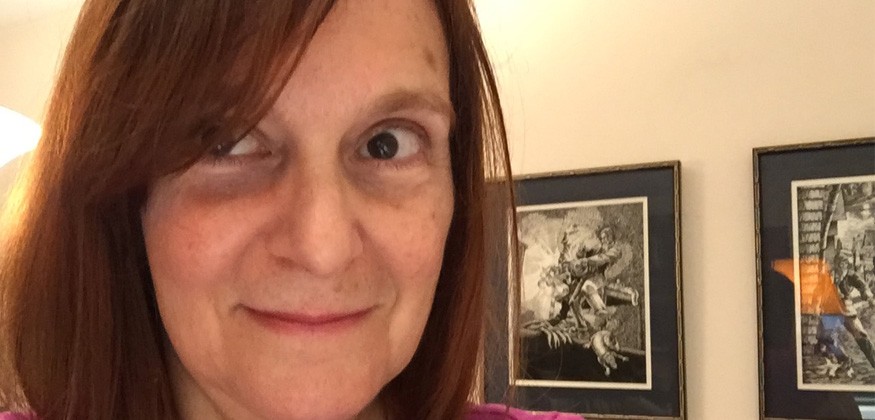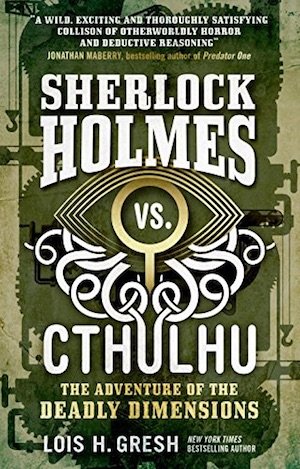 Lois H Gresh is an established editor and writer of short fiction whose first novel for Titan Books. The American author’s latest release, Sherlock Holmes vs Cthulhu: The Adventure of the Deadly Dimensions, marks the start of an exciting trilogy pitting the supreme rationalist and world’s first consulting detective against the inexplicable cosmic horrors of HP Lovecraft’s Cthulhu Mythos. Our full review is available to read here, and two more books are to follow, but in the mean time we are delighted that Lois has stopped by to answer some of our questions.
Lois H Gresh is an established editor and writer of short fiction whose first novel for Titan Books. The American author’s latest release, Sherlock Holmes vs Cthulhu: The Adventure of the Deadly Dimensions, marks the start of an exciting trilogy pitting the supreme rationalist and world’s first consulting detective against the inexplicable cosmic horrors of HP Lovecraft’s Cthulhu Mythos. Our full review is available to read here, and two more books are to follow, but in the mean time we are delighted that Lois has stopped by to answer some of our questions.
First of all, can you tell us a little about yourself and your writing career.
I’m a lifelong bookaholic, who loves a hard-hitting story with a fast pace and a killer ending. When I was a child, my family didn’t have much, and library books provided our entertainment. My father read science fiction, while my mother read mysteries and thrillers. I read my parents’ books, along with an ancient set of encyclopedias that sat on a shelf by my bedroom. My brother owned one book, a collection of Sherlock Holmes adventures.
My obsession with writing hit early and never let go. Teachers told me that I was destined to become a writer, but I dreamed of becoming a biochemist or geneticist. For two years in my teens, I wrote a biweekly medical newsletter for the government, attended night college in hopes of becoming a scientist, and in my spare time, wrote science-based mystery stories.
Life rolled forward. I ended up working as a computer programmer and creative technical director of online training programs. But guess how I spent my spare time?
By my early-20s, I’d written two novels, a novella, and at least 500 pages of practice dialogue and descriptions. My goal was to write something that I’d like to read, something that nobody else had written yet.
At this point, I’ve written 28 books and more than 65 short stories. My work has been published in 22 languages, and I’ve been lucky enough to be on the New York Times Bestseller List six times. I tend to write mysteries and thrillers with a science edge. When I shift into the supernatural, as I do in Sherlock Holmes vs Cthulhu: The Adventure of the Deadly Dimensions, I typically know the science underpinning the bizarre. I may not explicitly define the science in the story, but in my mind, what I’m describing could actually happen.
 What was your inspiration for pitting Sherlock Holmes against the gods of the Cthulhu mythos?
What was your inspiration for pitting Sherlock Holmes against the gods of the Cthulhu mythos?
The first adult book that I read as a child was my brother’s Sherlock Holmes collection. I feasted on those stories and read them many times. Remember, I wanted to be a scientist, a person immersed in facts and deductions, so I greatly admired Sherlock Holmes.
Lovecraft was one of the first fiction writers to explore concepts such as multidimensions, existentialism, the futility of anthropomorphic thinking, and a host of other ideas, including cryogenics and genetics. The core of the Cthulhu mythos actually has a scientific underpinning.
Having written both Sherlock Holmes stories as well as Cthulhu mythos stories, I thought the time was right to merge the two.
Arthur Conan Doyle and HP Lovecraft have become two of literature’s most enduring authors. There have been hundreds of Sherlock Holmes novels written and at the moment it seems like there is a new Lovecraft-themed anthology published every month. Can you identify any common feature of their writing that explains their success?
Sherlock Holmes is popular because people like to read stories that hold them in suspense, that thrill them, stories in which good defeats evil and justice prevails. Holmes lives to solve crimes. God forbid, if you’re ever in trouble, wouldn’t you want Sherlock Holmes on your side?
Arthur Conan Doyle also gives us Dr Watson, an enduring sidekick, whose medical expertise and empathy balance Holmes’ precise nature.
As for the popularity of Lovecraft – and weird fiction in general – think about the past decade of of scientific discoveries. With the Large Hadron Collider at CERN, imagination sparks with thoughts of multidimensions, black holes, time warps, dark matter. Scientists have cracked genetic codes and created nanomechanisms to heal our bodies. We are living in the time of The Weird. It is real. We will always enjoy stories that ignite our imaginations and show us worlds beyond our own.
If Holmes and Lovecraftian fiction bear a common feature, it might be that both feature strange, dark events. Murder. Suspense. Bizarre circumstances.
Sherlock Holmes famously refuted any supernatural explanation for his cases. Did you have any concerns about involving him in an occult mystery, and how did you overcome this?
Throughout the Sherlock Holmes vs Cthulhu trilogy, Holmes searches for a rational way to explain and resolve what appears to be supernatural phenomena. Stepping into the project, I already knew how Holmes would solve the various murders in these first three novels.
At the end of The Adventure of the Deadly Dimensions, Holmes’ fundamental nature remains intact. I’ve already finished the second novel, The Adventure of the Neural Psychoses, in which Holmes still insists on approaching the crimes with logic and facts.
I should mention that I’ve developed Dr Watson a bit, and injected his wife, Mary, into my novels. In addition, they have an infant, Samuel. Mary plays a significant role in the third novel, The Adventure of the Innsmouth Nightmares.
It’s fun to see Holmes trying to find a scientific explanation for the mysterious phenomena he encounters. One of the highlights of the book is the presentation of scientific knowledge in the Victorian Era. How did you go about researching this?
Oh, thank you! It was enormous fun for me to write this book. Yes, I’ve always loved science. This interest drove me to write a series of books for John Wiley & Sons – The Science of Superheroes, The Science of Supervillains, The Science of James Bond, The Science of Stephen King – as well as a bunch of other pop science titles.
And oh what fun I had researching Victorian science, culture, maps, and mannerisms. How did I do this research? With much gratitude to the University of Rochester library system. Also, I’m quite fond of England and have visited most of the places in my Holmes novels, talked to a lot of people there, and bought local books and maps.
Can you give us a hint of what the great detective will have to face in your next adventure?
The Adventure of the Neural Psychoses amplifies the overall threat posed in The Adventure of the Deadly Dimensions. In addition, a rift dumps killer creatures into the Thames River, and a plague of insanity races through London, afflicting even Dr Watson. People are addicted to devices that could have existed in Holmes’ time, but didn’t: I created the devices just for this book. In the midst of all of these catastrophes, a murderer runs wild, killing with purpose. Professor Moriarty, who is making a fortune on the suffering of the addicted, is out to get Holmes at any cost.
Read our review of The Adventure of the Deadly Dimensions here.









